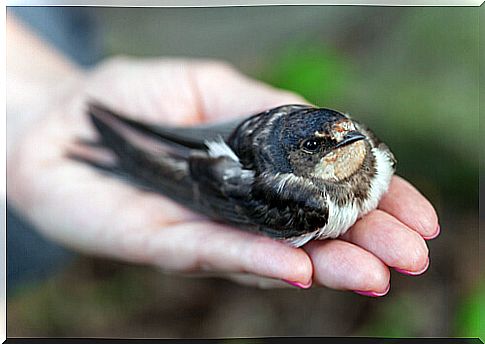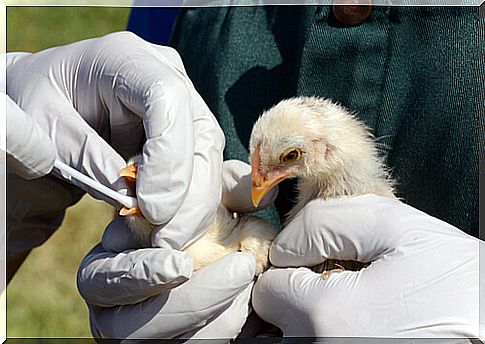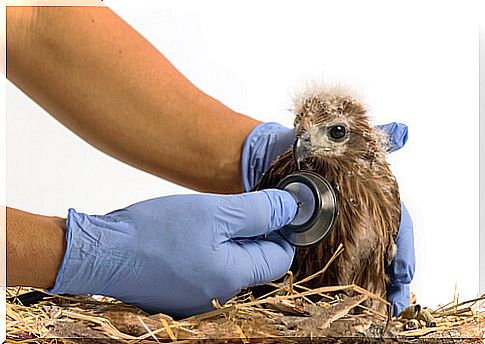How To Know If A Bird Is Sick

It is possible that throughout their lives your domestic birds contract some disease or be affected by parasites. In these cases, it will be essential to recognize the first symptoms to allow an early diagnosis. To help you, we will teach you how to recognize if your bird is sick.
When adopting a bird as a pet, it is essential to understand that they are sensitive animals and need to receive adequate preventive medicine to maintain good health.
The most alarming diseases in domestic birds
Before explaining the main signs that indicate that a bird is sick, we must analyze what are the most alarming diseases in domestic birds. In this way, it will be easier to recognize your symptoms and offer the appropriate care to prevent them.
Fowl cholera
It is a highly contagious disease among birds, caused by the bacterium Pasteurella multocida. Its contagion and progress in the body is very accelerated, especially among chickens and poultry.
The first symptoms of fowl cholera are usually a lack of thirst and appetite. That is, the bird stops drinking water and no longer shows interest in its food.
Influenza or bird flu
The influenza or bird flu is a severe and highly contagious viral disease caused by a virus belonging to the family Orthomyxovridae. It is one of the most dangerous diseases that can affect birds, with a mortality rate of almost 100%.

To know if a bird is sick with avian influenza we must be attentive to the following symptoms:
- Edema in the eyes.
- Bristly pumas.
- Swelling on the crest and chin.
Marek’s disease
This is one of the most common and alarming pathologies of birds in captivity, and it is caused by a herpes virus. Its progression is rapid and can lead to the formation of multiple tumors in the vital and reproductive organs (lungs, liver, ovaries, etc.).
Due to its possible complications and consequences, it is essential to diagnose this pathology early and establish an appropriate treatment to stop it.
Marek’s disease is generally silent and progresses without generating any visible signs. In a more advanced stage, the progressive paralysis of the wings and legs is the most characteristic symptom of this pathology.
6 common signs to know if your bird is sick
As we can see, each disease has its own symptoms, which can also vary according to the organism of each bird. In summary, we can name some common signs that usually indicate that a bird is sick:
- Alterations in appetite. Lack of appetite is one of the most common symptoms in domestic birds, and is associated with many diseases. However, some pathologies and the presence of intestinal parasites can also lead to increased food consumption.
- Alterations in water consumption : a large part of the pathologies that affect birds generate alterations in their habitual water consumption. On the one hand, metabolic disorders, such as diabetes, can lead to increased water intake; some diseases such as fowl cholera cause a lack of thirst.
- Plumage problems. The loss of feathers or changes in the color, brightness or texture of the plumage can be symptoms of external parasites and diseases. Redness of the skin and itching are also frequent signs of skin problems or infections.
- Bowel problems. The feces of our pets say a lot about their health. Changes in bowel movements, whether in color, frequency, quantity, or texture, are causes for concern.

Breathing and behavior problems
- Difficulties in breathing. Numerous diseases can affect the respiratory tract of birds, causing shortness of breath, coughing, snoring, etc. In addition, respiratory problems also often alter singing.
- Behavior changes. If a bird is sick, its behavior can be altered. Some birds are hyperactive or aggressive, while others are quieter, less active. It is essential to go quickly to the specialist veterinarian when identifying any alteration.
As we can see, many pathologies progress silently and compromise the health of your bird without showing visible signs. Therefore, it is essential to invest in prevention to take good care of your domestic birds.
Do not forget to make preventive visits every six months to the specialist veterinarian, in addition to respecting vaccines and deworming.









